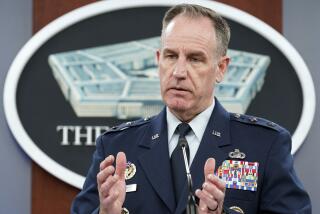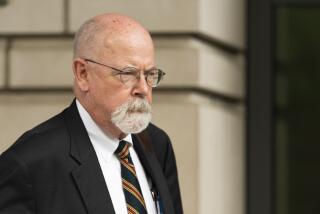Inspector’s Report to U.N. Cites Lack of Iraqi Cooperation
- Share via
UNITED NATIONS — Declaring that Iraq had “initiated new forms of restrictions,” the United Nations’ chief weapons inspector concluded Tuesday that President Saddam Hussein had failed to restore full cooperation with arms monitors.
The report once again raised the possibility of sudden attacks by U.S. and British military forces and presented the Security Council with a negative assessment that could curtail any review designed to possibly lift Gulf War sanctions that have crippled Iraq’s economy.
In blunt language, Richard Butler, chairman of the U.N. Special Commission in charge of dismantling Iraq’s arsenal of weapons of mass destruction, said that despite the prospect of a comprehensive review, Baghdad’s “conduct ensured that no progress was able to be made in either the fields of disarmament or accounting for its prohibited weapons programs.”
“In the absence of full cooperation by Iraq, it must regrettably be recorded again that the commission is not able to conduct the substantive disarmament work mandated to it by the Security Council and thus to give the council the assurances it requires with respect to Iraq’s prohibited weapons programs,” Butler concluded.
The United States and Britain have taken the position that they have all the authorization they require from the council to launch military action.
President Clinton, who returned to Washington late Tuesday from a three-day trip to the Middle East, spent much of the flight discussing the report with senior staff, a senior U.S. official said, adding that Clinton and his advisors will meet today on the situation.
The report “clearly says there’s a failure to cooperate--and worse. Iraq has imposed new restrictions,” the U.S. official said.
“We consider this a very serious matter,” White House spokesman P.J. Crowley said.
One Clinton administration official declined to respond directly to rumors circulated by British diplomats at the United Nations that the United States might undertake military action against Iraq within the next few days.
“I’m not going to speculate on what decision the president may make,” the official said. “We have all the authority we need under the relevant Security Council resolutions to act. All options remain on the table.”
Butler said the government in Baghdad had refused to turn over documents to monitors and had blocked inspectors from entering the headquarters of Iraq’s ruling Arab Baath Socialist Party and a facility in Iraq occupied by the People’s Moujahedeen, an Iranian opposition group.
Iraqi officials refused to allow a U.N. team searching for biological weapons to question graduate students at sites where research previously was declared.
A team monitoring chemical weapons found unacceptable conditions placed on the photographing of bombs as Iraqi authorities cited “national security concerns,” the report said. No pictures were taken.
At the former headquarters of Iraq’s Special Security Organization, inspectors found the building was emptied of any relevant materials. “Iraq would not disclose where those materials were now held,” Butler said.
He said clear evidence existed that Iraq had taken “advance actions” at certain locations to defeat search teams and that he decided not to conduct the full range of activities one team had planned.
The Special Commission chairman said Iraq’s actions were part of a pattern going back to the end of the Gulf War.
“From the inception of the commission’s work in Iraq in 1991, Iraq’s cooperation has been limited,” Butler said.
“In spite of the years that have passed and the extensive work that has been undertaken, [the commission] has not been able to verify Iraq’s claims with respect to the nature and magnitude of its proscribed weapons programs and their current disposition,” he added.
“Iraq’s current claims that it has fulfilled all of its disarmament obligations in each weapons area, ceased concealment policies and actions, and that it has neither proscribed weapons nor the ability to make them cannot be accepted without further verification,” the report said.
Butler submitted his report to U.N. Secretary-General Kofi Annan on Tuesday evening. They conferred briefly before both attended a Christmas party at the United Nations, where they were peppered with questions, which neither official answered.
Yet the gravity of the situation was clear. Immediately after leaving the party, Annan distributed the report to the 15 members of the Security Council.
Iraq pledged cooperation with the weapons inspectors last month when U.S. bombing was averted at the last minute.
At that time, the Clinton administration and the British government said additional efforts to thwart the arms monitors could result in attacks without warning.
Diplomats said late Tuesday that Butler had not been asked by U.S. officials to remove the U.N. weapons inspectors from Baghdad, as he had when bombing seemed imminent in November.
The U.S. has sizable forces in the Gulf region, including at least half a dozen B-52 bombers based on the Indian Ocean island of Diego Garcia that could be used in an attack.
Iraq limited the inspectors’ work Aug. 5, then stopped it Oct. 31--until Baghdad bowed to threats of imminent bombing.
Butler’s report was designed to allow the Security Council to determine whether it will conduct a comprehensive review of Iraq’s record in destroying its weapons of mass destruction, as Baghdad was required to do by resolutions enacted after the Gulf War.
Iraq’s supporters were expected to argue that the incidents cited by Butler in his report were only a small fraction of the vast number of inspections. British and American diplomats were expected to stress the seriousness of Iraq’s efforts to block the arms monitors.
Times staff writers Elizabeth Shogren and Robin Wright in Washington contributed to this report.
More to Read
Sign up for Essential California
The most important California stories and recommendations in your inbox every morning.
You may occasionally receive promotional content from the Los Angeles Times.












